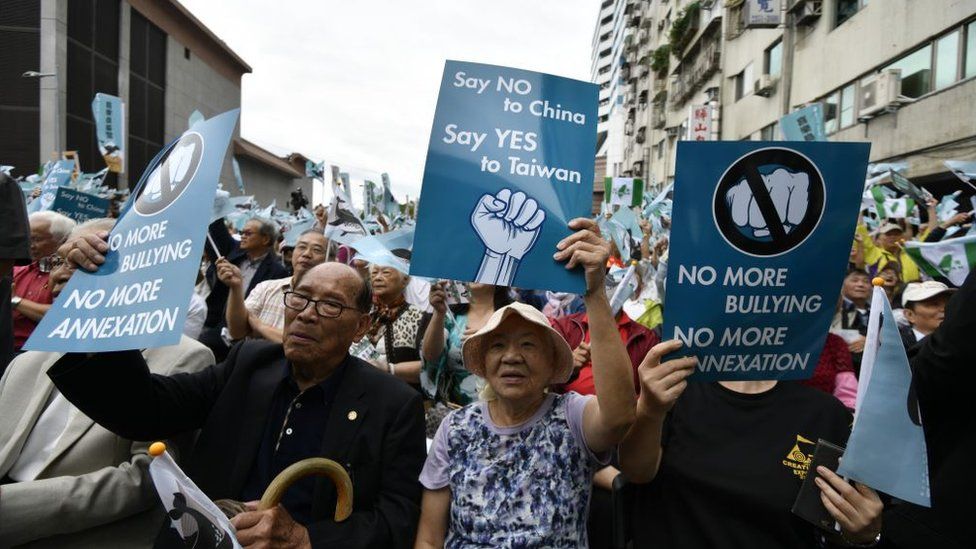The Chinese Communist Party DoubleSpeak
"By 2025, China will bring the cost [of war] and attrition to its lowest.""It has the capacity now, but it will not start a war easily, having to take many other things into consideration.""For me as a military man, the urgency is right in front of me.""[The situation with China] is the most severe in the 40 years since I've enlisted. [China would have] comprehensive [capabilities to invade Taiwan by 2025]."Taiwan Defence Minister Chiu Kuo-cheng"I've spoken with Xi about Taiwan. We agree ... we'll abide by the Taiwan agreement.""We made it clear that I don't think he should be doing anything other than abiding by the agreement."U.S. President Joe Biden
 |
| Chinese President Xi Jinping Andy Wong/AP |
"Reunification of the nation must be realized, and will definitely be realized.""Reunification through a peaceful manner is the most inline with the overall interests of the Chinese nation, including Taiwan compatriots.""Aggression and hegemony are not in the blood of the Chinese people. Our people hope to successfully realize national development, but they also hope to see all peoples of the world leading happy and peaceful lives.""China will remain a champion of world peace, a contributor to global development, and a defender of the international order, and we will do our very best to make even greater contributions to humanity.""Through courage and skill, we will overcome all major risks and challenges that may impede our path to national rejuvenation and resolutely safeguard our national sovereignty, security and development interests."Chinese President Xi Jinping
 |
| Recent polls show many Taiwanese support the government's approach in "safeguarding national sovereignty" AFP/Getty Images |
Taiwan
values its independence as a sovereign nation. Since its historic split
with the mainland in 1949, its political path diverged wildly from that
of China. Taiwan is a vibrant democracy with a multi-party system and
fair and open elections. It wants no part of China's one-party Communist
China system; a severe autocracy focused on population control and a
towering ambition to lead a new world order.
Taiwan
knows very well what is in store for it, in plain sight beyond the
threats, when Beijing shut down democracy in Hong Kong and absorbed the
island state, breaking a contract designed around "one country, two systems".
Taiwan
will not forego its system to be absorbed with China. And when
President Xi spoke of the ideal transition of peaceful absorption what
he really meant was that a steadfastly recalcitrant Taiwanese
administration would do well to set aside its unwillingness to reunify
and submit to China's all-encompassing ambition to recapture the
breakaway island state and return it as a province of China.
For
all of President Xi's faux optimism of a biddable Taiwan and the soft
lullaby of a peaceful transition, he has issued statement after
statement couched in semi-diplomatic language not quite concealing
implicit threats. And beyond the implicit subtlety of language there is
the indisputable violence of a different kind of threat with the
deployment of Chinese war planes buzzing Taiwanese air space.
Where
over the course of less than a week the People's Liberation Army
dispatched fighter jets, bombers and airborne early warning aircraft no
fewer than 149 times toward Taiwan latterly. One of the air manoeuvres
involved 52 jets. Intimation of the first order. A warning that could
not possibly be misinterpreted.
The
gamble that an unrelenting ferocious display of power hinting at the
destruction that could be unleashed by an angry Beijing at Taiwan's
stubborn rejection of reunification proposals would bring an abject
Taiwan to its knees was destined to fail.
But
the offer of a peaceful transition is there, cloaked in the grim threat
of military invasion. President Xi's plan is laid out neatly enough.
Reunification is the melding destiny of the two; it can be achieved
without bloodshed if one of the party relinquishes its foolish
separation of what is manifestly meant to be a unified whole.
The
alternative to an ongoing stalemate which has gone on too long, would
be lives lost unnecessarily and the goal achieved regardless.
China's
influence on the world stage transcends that of Taiwan by a wide
margin; one the master bully, the other the self-respecting island state
determined to go its own way; as at variance as a cultural, social,
political entity from its former status as a geographically captured
satellite of an Asian giant as it might be possible to imagine.
Taiwan's
reputation and dignity in its status as a breakaway province lacks the
distinction of recognition by the international community thanks to
China's manipulative thrust at the UN. Nations that recognize Taiwan's
sovereign independence risk backlash from powerful China whose
no-holds-barred retaliation of presumed insults have become legendary.
But
Taiwan continues to assert its independence with its own display of
military equipment in response to that of China's. Fighter jets
scheduled to put on a National Day display of its own military prowess
and readiness to respond to China's provocations. Under Taiwanese
President Tsai Ing-wen Taiwan doesn't flinch. There will be no
'peaceful' reunification.
| A man walks on an overpass in Taipei, Taiwan, decorated with Taiwanese flags earlier this week ahead of the country's National Day, which is celebrated on Sunday. (Ann Wang/Reuters) |
Labels: Beijing, President X.Jinping, Reunification, Taiwan, Threats

<< Home